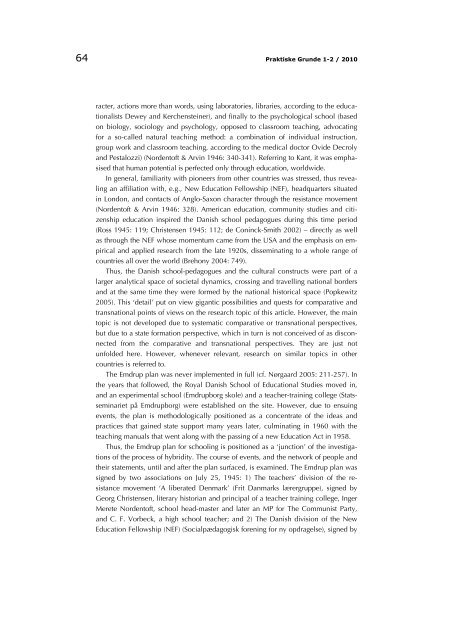Download - Praktisk Grunde
Download - Praktisk Grunde
Download - Praktisk Grunde
Create successful ePaper yourself
Turn your PDF publications into a flip-book with our unique Google optimized e-Paper software.
64 <strong>Praktisk</strong>e <strong>Grunde</strong> 1-2 / 2010<br />
racter, actions more than words, using laboratories, libraries, according to the educa-<br />
tionalists Dewey and Kerchensteiner), and finally to the psychological school (based<br />
on biology, sociology and psychology, opposed to classroom teaching, advocating<br />
for a so-called natural teaching method: a combination of individual instruction,<br />
group work and classroom teaching, according to the medical doctor Ovide Decroly<br />
and Pestalozzi) (Nordentoft & Arvin 1946: 340-341). Referring to Kant, it was empha-<br />
sised that human potential is perfected only through education, worldwide.<br />
In general, familiarity with pioneers from other countries was stressed, thus revea-<br />
ling an affiliation with, e.g., New Education Fellowship (NEF), headquarters situated<br />
in London, and contacts of Anglo-Saxon character through the resistance movement<br />
(Nordentoft & Arvin 1946: 328). American education, community studies and citi-<br />
zenship education inspired the Danish school pedagogues during this time period<br />
(Ross 1945: 119; Christensen 1945: 112; de Coninck-Smith 2002) – directly as well<br />
as through the NEF whose momentum came from the USA and the emphasis on em-<br />
pirical and applied research from the late 1920s, disseminating to a whole range of<br />
countries all over the world (Brehony 2004: 749).<br />
Thus, the Danish school-pedagogues and the cultural constructs were part of a<br />
larger analytical space of societal dynamics, crossing and travelling national borders<br />
and at the same time they were formed by the national historical space (Popkewitz<br />
2005). This ‘detail’ put on view gigantic possibilities and quests for comparative and<br />
transnational points of views on the research topic of this article. However, the main<br />
topic is not developed due to systematic comparative or transnational perspectives,<br />
but due to a state formation perspective, which in turn is not conceived of as discon-<br />
nected from the comparative and transnational perspectives. They are just not<br />
unfolded here. However, whenever relevant, research on similar topics in other<br />
countries is referred to.<br />
The Emdrup plan was never implemented in full (cf. Nørgaard 2005: 211-257). In<br />
the years that followed, the Royal Danish School of Educational Studies moved in,<br />
and an experimental school (Emdrupborg skole) and a teacher-training college (Stats-<br />
seminariet på Emdrupborg) were established on the site. However, due to ensuing<br />
events, the plan is methodologically positioned as a concentrate of the ideas and<br />
practices that gained state support many years later, culminating in 1960 with the<br />
teaching manuals that went along with the passing of a new Education Act in 1958.<br />
Thus, the Emdrup plan for schooling is positioned as a ‘junction’ of the investiga-<br />
tions of the process of hybridity. The course of events, and the network of people and<br />
their statements, until and after the plan surfaced, is examined. The Emdrup plan was<br />
signed by two associations on July 25, 1945: 1) The teachers’ division of the re-<br />
sistance movement ‘A liberated Denmark’ (Frit Danmarks lærergruppe), signed by<br />
Georg Christensen, literary historian and principal of a teacher training college, Inger<br />
Merete Nordentoft, school head-master and later an MP for The Communist Party,<br />
and C. F. Vorbeck, a high school teacher; and 2) The Danish division of the New<br />
Education Fellowship (NEF) (Socialpædagogisk forening for ny opdragelse), signed by



